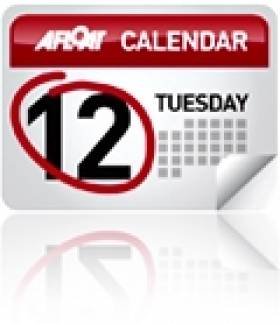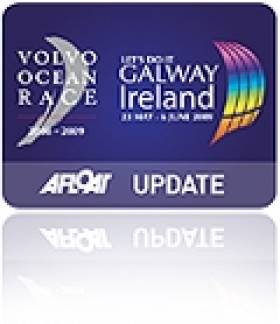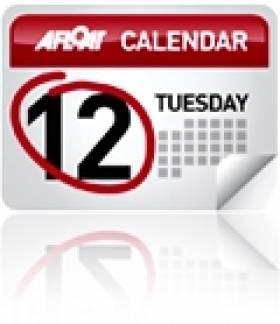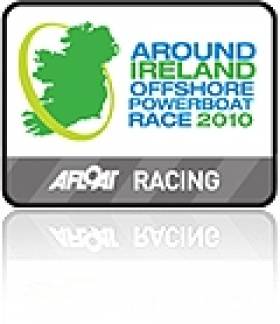Displaying items by tag: Galway
Galway Powerboat Timetable Here
Saturday 05 June Day 1 P1 Superstock Grand Prix of Galway
The P1 Superstock Championship will see some of the UK's biggest thrill seekers tackling the challenging elements of the Atlantic Ocean. Consisting of two race classes, 150 and 300, 14 P1 powerboats will entertain locals, tourists and motor sport fans alike, as they enter into high-stakes speed racing on Galway Bay. Each boat has exactly the same manufactured hull and identical engines, which means that the onus is placed firmly on the skills and nerve of the driver and navigator. Live commentary in Salthill.
1030: Practice Race
1330 and 1415: Race Start 150 Class
1430 and 1515: Race Start 300 Class
1700: Podium prizegiving in the Race Village
Sunday 06 June Day 2 P1 Superstock Grand Prix of Galway
Live commentary in Salthill
1030: Practice Race
1330 and 1415: Race Start 150 Class
1430 and 1515: Race Start 300 Class
1700: Podium prizegiving in the Race Village
Monday 07 June Start of the Around Ireland Powerboat Race and Day 3 P1 Superstock Grand Prix of Galway
The Around Ireland Offshore Powerboat Race requires offshore navigation capabilities combined with rock solid reliability to ensure success. The mix of physical rigour with technical performance is what attracts most people to the event. The ability to endure in an extreme environment is what offshore racing is all about.
0900 Start of the Around Ireland Powerboat Race.
1130 and 1215: Race Start 150 Class (P1 Superstock)
1230 and 1315: Race Start 300 Class (P1 Superstock)
1430 Final podium prizegiving for the P1 Superstock Grand Prix of Galway in the Race Village
Around Ireland Powerboat Race overnights in Killybegs (local festival)
Tuesday 08 June
Galway Powerboat Festival continues in the Race Village 1000 – 1030
Stage 2 of Around Ireland Powerboat Race Killybegs to Belfast. Overnight in Belfast
Wednesday 09 June
Galway Powerboat Festival continues in the Race Village 1000 – 1030
Stage 3 of Around Ireland Powerboat Race Belfast to Waterford. Overnight in Waterford
Thursday 10 June
Galway Powerboat Festival continues in the Race Village 1000 – 1030
Around Ireland Powerboat Race: Layday Waterford. Overnight Waterford
Friday 11 June
Galway Powerboat Festival continues in the Race Village 1000 – 1030
Stage 4 of the Around Ireland Powerboat Race Waterford to Fenit (Overnight Fenit at the Fenit Sea Breeze Festival)
Saturday 12 June P750 Cross border Championships and finish of the Around Ireland Powerboat Race
Galway Powerboat Festival continues in the Race Village 1000 – 1030
1000 Round 1 of the P750 Powerboat Championship
1400 Finish of the Around Ireland Powerboat Race and prizegiving in the Race Village
Jet Ski activity on the bay all day
Thirteen thrill-seeking powerboat racing teams will charge into Galway on Ireland’s west coast this week for round two of the Powerboat P1 SuperStock Championship. The Galway Grand Prix of the Sea will kick-start the Irish bank holiday weekend celebrations and begin a seven-day powerboat racing festival.The Powerboat P1 SuperStock Championship provides the opening act for the nautical extravaganza, which sees the Around Ireland Offshore Powerboat Race headlining a top billing of the finest competitive offshore powerboat racing.
Ocean Day Events at Galway Aquarium
Galway's National Aquarium is pushing the boat out for World Ocean Day on Sunday, with Bjorn the Polar Bear the main attraction. Bjorn and handler Ursula are among a line-up of special guests that include wildlife filmmaker Vincent Hyland, a diving world record holder, and the Irish Seal Sanctuary. There will be three Polar Bear shows, 11.00, 1.00 and 3.00pm (Tickets will be allocated for each show, early arrival is advisable!) The Aquarium is open from 10.00am to 5.00pm General Admission will apply except for a Special Family Ticket (2 Adults + 2 Children) only 25.00 euros Tickets valid all day and include all activities For more information contact us at the aquarium on 091 585100 or email [email protected]
VOR Organiser to Receive Honorary Doctorate
Volvo Ocean Race organiser John Killeen is to be honoured by NUI Galway this June with an honorary doctorate.
The Let’s Do It Ireland Chairman, who was responsible for bringing the hugely successful Volvo Ocean Race to Galway, is on a list that includes Seán Ó’hUiginn, the Irish diplomat and former Ambassador to the US and Germany, VHI chairman Bernard Collins, and Anne Maria Dennison, head of the Irish Countrywoman’s Association.
The ceremony will take place on Friday June 25th.
Killeen is also CEO of the Colas Group, chairman of the Galway Docklands Redevelopment Committee and a former president of the Academy of Engineering and the Institution of Engineers of Ireland.
Spiddal Open Day this Sunday
The club is recognised by the ISA, and runs ISA-approved youth training courses for its members every year, ranging from an introduction to sailing to more advanced techniques. Its course programme this year runs from 28 June to 9 July.
Weather permitting, there will be opportunities to try your hand at crewing or helming in Spiddal harbour from 2.30pm to 4.30pm.
Galway Plays Host to Around Ireland Powerboat Race
Galway will play host yet again to a major water sport event this June with 3 events in one starting with the PI Powerboat Grand Prix of Galway on the bay 05-07 June, the start of the Around Ireland Powerboat Race on 07 June and the P750 Zapcat Challenge in the Bay 12-13 June. Alongside the activity on the bay, Galway will yet again host a major festival in the Race Village at Galway Harbour and in Salthill with free concerts, amusements, bars, food and crafts. www.aroundireland.org www.aroundireland.org
Britain’s most exciting new motorsport, the Powerboat P1 SuperStock Championship, is the newest addition onto the heavyweight bill for the Around Ireland Offshore Powerboat Race, beginning in Galway Bay on 5 June. Kick-starting the bank holiday weekend celebrations, round two of the 2010 SuperStock Championship will see some of the UK’s biggest thrillseekers tackle the challenging elements of the Atlantic Ocean, which is certain to provide an unforgiving racecourse for the Irish powerboat racing festival.
"The event will showcase the beauty of the Irish coastline and present our teams with a fantastic opportunity to race in the heart of an effervescent city, watched by thousands of powerboat racing fans.” Stated SuperStock Championship spokesman, Sam Feasey
Bringing additional coverage to Galway, the Powerboat P1 SuperStock Championship will be screened on British Eurosport, further highlighting Galway’s credentials to host world class events.
Following on from the success of the Volvo Ocean Race’s stopover in Galway in 2009, Feasey added that Powerboat P1 is confident that its racing fleet will augment Galway’s
passion and pride for its maritime activity.
Consisting of two race classes, 150 and 300, up to twenty identical powerboats measuring between 21 and 27 ft respectively, will entertain locals, tourists and motorsports fans for three enthralling races on Saturday, Sunday and Monday.
On Bank Holiday Monday 07 June 2010 at 0900, offshore powerboats will leave Galway Bay in pursuit of the Around Ireland Offshore Powerboat title. The race will circumnavigate the entire coast of Ireland and will be the toughest endurance powerboat race on the International circuit.
The 5 days of racing will be a true test of man and machine and there will be 5 stages with events at each of the stopovers:
Galway to Killybegs (07 June)
Killybegs to Belfast (08 June)
Belfast to Waterford (09-10 June)
Waterford to Fenit (11 June)
Fenit to Galway (12 June) Fenit Sea Breeze Festival will run Friday 11- Sunday 13 June
Onshore in Galway a festival programme of music and entertainment, and food and craft markets will ensure fun for all the family against the backdrop of the programme on the water. Likewise at each of the stopover stages similar festival programmes will greet the race on arrival and ensure excitement and drama for each re-start.
The Galway Race Village will open from 1000 -2230 daily and there is a full programme of entertainment including the now famous Crystal Swing on the main stage on Sunday 06 June at 1730. In total over 20 acts are scheduled to perform over the 8 day festival including - the Cartoon Thieves, the Timber Tramps, Joe Furey and The Hayride and Emmet Scanlan and What the Good Thought
For the finale on 12 June, prepare to be amazed and in awe at the P750 Cross Border Championship and make sure you are at the dock to welcome back the winner of the Around Ireland Powerboat Challenge on Saturday 12 June.
Ballinduff Bay Watersports Club
Ballinduff Bay Watersports Club
Ballinduff Bay Watersports Club, c/o Keith Collins, Grange, Corrandulla, Co Galway. Tel: 086 601 9862, email: [email protected]
Have we got your club details? Click here to get involved
Corrib Rowing and Yachting Club
Welcome to the CRYC web site which we hope will be of interest to members and visitors alike. Established in 1864, the CRYC is one of the oldest inland waterway clubs in the British Isles. Located in the centre of Galway City it continues to provide facilities for water-based recreational activity for almost 300 members.
Corrib Rowing & Yachting Club, Earls’ Island, Distillery Road, Newcastle, Galway. Tel: 091 564560, email: [email protected]
(Details courtesy of Corrib Rowing & Yachting Club)
Have we got your club details? Click here to get involved





























































